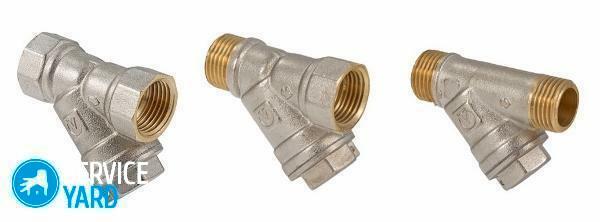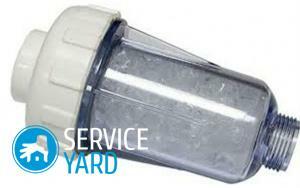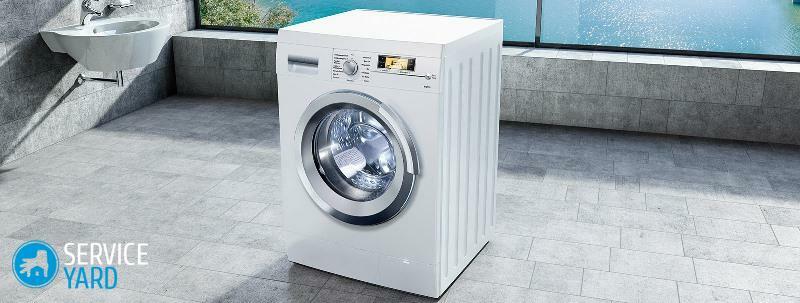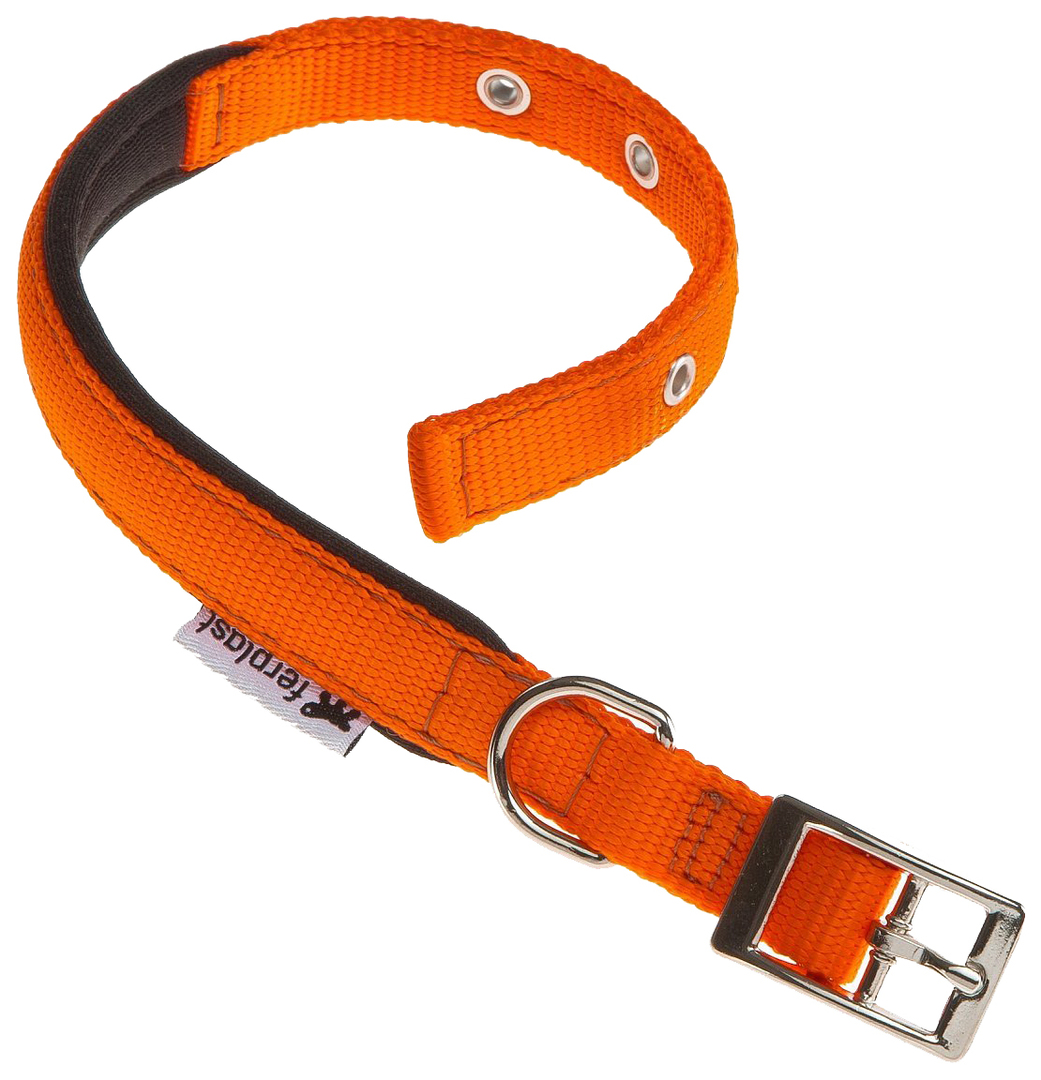
- Which impurities are dangerous for the washing machine?
- Types of water filters for a washing machine
- Installing a filter for a washing machine
- Useful advices:
Washing machine - an indispensable assistant housewives. This unit has firmly taken its place in every house. There is a lot of such household appliances, and of course, each of us expects a long service life, and for this it is necessary to create an optimal operating mode, in particular, to put a filter for the washing machine. The question may arise: "Why worry, because in modern models of devices there is already a filter?" Of course, there is a fine-mesh metal mesh on the water inlet, but it can only hold large debris, that is, its capabilities are limited. Coping with hard water, rust, mud - the main enemies of modern household appliances, will only help a special filter for the washing machine in bad water.
to the contents ↑Which impurities are dangerous for the washing machine?
The internal parts of the device are constantly in contact with the tap water. It's no secret that the quality of water that enters our homes is very low. As a result, the impact of hard, chlorinated water adversely affects the state of the fragile parts of the unit. Particularly affected by bad water heating element, drainage system and drum bearings.
In most devices, a coarse filter element is installed, which detains large rubbish, buttons, threads, hair, but it can not cope with small harmful particles.
Consider what impurities are particularly dangerous for the machine:
- Mechanical impurities. They are able in time to completely clog the internal filter element. As a result of such a malfunction, the inlet pressure will drop and the machine will stop recruiting water. In addition, in dirty water, things are washed much worse.
- Rigid water. When heated, the hard salts settle on the walls of the heating element and other parts in the form of a solid scale. As a result, more electricity is needed to heat the water, and over time such a hard coating can cause the unit to break down.
Installing a filter for a washing machine, albeit an expensive, but economically feasible solution. Any breakdown of household appliances will result in even more significant costs for repairs.
to the contents ↑Types of water filters for the washing machine
Summarizing the above, we conclude that the ideal filter for the washing machine should clean the water of mechanical impurities and, if necessary, soften it. The chemical composition of the water supplied to the house can be determined by making a laboratory analysis. Based on the results, choose the type of filter that is necessary for you.
Manufacturers offer several options for filter elements.
Trunk filter for washing machine
This type of cleaning element does not apply directly to the devices, since it is placed on the inlet main pipeline and cleans all water entering the house or apartment.
The task of such a device is to purify all water from sand, rust and harmful impurities. If you have hard water running from the water pipe, it will remain so.
Coarse filter
This is a special filter that is used directly for machines - both washing and dishwashers. The coarse filter is installed in front of the filler hose.
This type of device very well eliminates all impurities and harmful substances, but does not soften the water.

Polyphosphate
This type of device is designed to eliminate water hardness. As an emollient element, sodium polyphosphate is used. As part of the filter element, sodium polyphosphate is presented in the form of transparent crystals in kind resembling salt. The filter is made in the form of a bulb.
Passing through the device, the substances forming a scum are enveloped by molecules of polyphosphate of sodium and neutralized. Suitable only for industrial water, because after such a treatment, water becomes unsuitable for drinking.
Advantages of this device:
- Easy to maintain. You can independently pour the active substance into the flask as needed.
- Low cost. Virtually everyone can purchase the device.
- The installation of the filter element is simple enough. Anyone can do it.

Magnetic
A modern filter for softening water for a washing machine, according to manufacturers, affects the water with a magnetic field. This type of filter is installed over the filling hose. Advantages of the device:
- Does not require any disassembly and rework of communications.
- Eco-friendly.
- Durable and reliable.
- High performance.
- High performance.
- Possibility to use also for drinking water purification.
However, many experts doubt its effectiveness, so do not advise buying.
Filter classification according to the cleaning principle
According to the principle of operation, the filter elements are divided into:
- Biochemical. Performs the most qualitative cleaning of impurities of metals and harmful substances. Disadvantages: high cost, the need for frequent replacement of cartridges.
- Catalytic. This filters for the washing machine from iron and stiffness. They are most relevant for automatic machines, since they significantly reduce the risk of scale formation.
- Mechanical. Used most often, which is due to low cost and the principle of operation. For cleaning, several layers of different material are used: rope and cotton or rope, polypropylene and coal. The filter gradually, layer by layer, cleans first large substances, and then - small particles to 5 microns. Triple cleaning allows not only to remove minute impurities, but also to soften the water a little.
- Ion exchange filtration. A filter is specially designed for washing machines and allows to soften water. The cost of the device is approximately the same as biochemical, but the cartridges have to be changed more often.
Installing the filter for the washing machine
Each filter for the washing machine is installed according to its own algorithm. Depending on which device you prefer, follow these guidelines.
Trunk filter:
- Close the water pipes.
- In the area after the water meter and shut-off valve, cut a small piece of pipe.
- Mount the filter in place of the remote pipe section.

Coarse cleaning
The coarse filter should be installed during the connection of the washing machine to the water supply:
- From the pipe, draw a conclusion with a separate crane for the machine.
- Connect the filter to the output.
- Connect the water inlet hose to the cleaning device.
Important! Polyphosphate is installed according to the same scheme as the coarse device.
Magnetic
Magnetic device is installed very simply: fix the device on the filling hose with the fixatives that come with it.
to the contents ↑Useful advices:
- If you decide to purchase a main filter for a washing machine, pay attention to the "Geyser 1P" model. It perfectly protects household appliances from bad water. The cartridge of the device is made of expanded polypropylene.
- The "Aquaphor Stiron" coarse filter allows you to use less detergent and completely abandon the anti-scale agents. Effective work of the cleaner is enough for about three hundred washes.
- When choosing polyphosphate filters, pay attention to water softeners from the manufacturers "Geyser" and "Atlantic".
- We recommend that you, if possible, install two filters: one - for water purification, the second - for mitigation. The same advice is given by specialists.
The quality of water treatment depends on the quality of the filter and the degree of contamination of the tap water. We hope that thanks to the information obtained in the article, you will be able to select a reliable filter for your assistant, which will relieve her from breakages, and you - from a headache.


